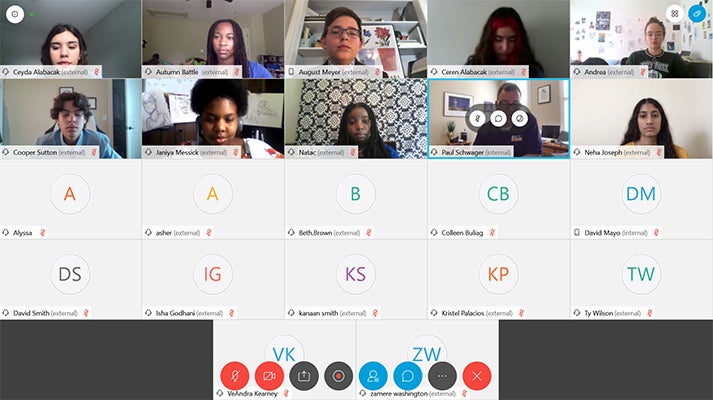Summer Innovation Academy expands digital reach
While many Pirates continue to shelter in place during the COVID-19 pandemic, East Carolina University’s Summer Innovation Academy expanded its reach, albeit virtually.
For the first time in its three-year history, the academy welcomed students from across the country — as far west as California — for a week of building their entrepreneurial skills beginning June 15. The summer academy doubled its registrations from the previous two years, welcoming potential future Pirates from Virginia, Florida and Colorado.

A group of Summer Innovation Academy students share their business ideas during the event’s final pitch competition on June 20. The third annual academy, hosted by the Miller School of Entrepreneurship, went digital this summer and hosted students from as far west as California. (Photo courtesy of MSOE)
Those out-of-state participants made up a pool of 50 middle and high school students that learned the basics of entrepreneurship from Miller School of Entrepreneurship instructors and mentors. During the academy, the next generation of business builders was introduced to successful business startup methodology and received one-on-one feedback from local entrepreneurs and investors.
Miller School of Entrepreneurship teaching instructor Corey Pulido, who led the academy this year, said that being able to adapt to change — like moving the in-person camp to a virtual format — is a defining feature of an entrepreneur.
“This is a prime example of discovering that there’s a problem and creating a solution that adds value,” Pulido said. “Each year the academy has created its own theme related to how we grow as entrepreneurs. This year was no different.
“We were able to bring in a lot more virtual mentors,” he said. “It’s something we couldn’t have done with a face-to-face academy because of the professionals’ time schedule. In the future, I think more online components are imperative.”
Jimena Nunez, 15, learned about the academy from an Instagram story posted by one of her school’s Future Business Leaders of America officers. Nunez, who lives in Colorado, didn’t hesitate to apply to the academy.
“I saw a post about the academy the day before applications were due,” Nunez said. “It was a new opportunity and I thought, ‘I might as well take it.’ It’s not something I could have done if it wasn’t online.”
Nunez said she learned a lot during the week that will benefit her even if she doesn’t decide to pursue a career in entrepreneurship.
“What I’ve learned, especially when it comes to interviewing, is something I can take back to school with me,” she said. “I love public speaking, but I tend to get so excited that I run over things. This week has helped me think through what I’m doing.”
The team of Go Green Coolers, led by teammates August Meyer, Cooper Sutton and Neha Joseph, was named the winner of the academy’s end-of-week pitch competition. The trio put together the idea to develop an environmentally friendly cooler that dispenses ice.
“What I’ve learned is that it doesn’t matter what age you are or what past experience you have,” Meyer, 13, said. “It just matters if you have a really good idea, a group of people to share it with, and the right feedback to make changes. During the academy I’ve been able to connect with trusted mentors that can help me move this idea forward.”
Zamere Washington, 15, said the experience of working with younger students helped him become more of a leader. His team’s business idea revolved around shoe customization.
“There was a younger member in my group and I was able to help flow off their ideas,” Washington said. “I was able to teach them about the different types of shoes, their costs and the little details that go into building a business idea.”
Despite not physically being on campus, Pulido said the ECU spirit was still strong at the virtual academy.
“You can’t replace the experience we’ve given in the past by getting students to physically walk on campus,” Pulido said. “But there are still ways they can experience ECU. University alumni and stakeholders assisted with the mentoring process. Faculty and staff communicated with students, making them feel at home. This all feeds into the entrepreneurial ecosystem we’re creating at ECU. We’re making ECU not only a ‘viable’ option for their education, but a top tier university that cares about the future of its students.”